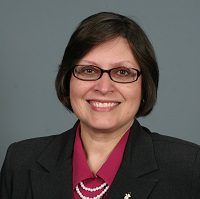Volume 35 Number 3 | June 2021
Jean Bauer, MLS (ASCP)CM, ASCLS Region V Director

I would say yes, as I have a real-life example to talk about. I work as a technical consultant and lab director for two clinics. Their leadership and their staff are primarily of black, Asian, or other non-white races with diverse personal histories. This diversity is a mirror image of the community and the patients they serve. Some were born in the United States, but many of them immigrated, made a home for their families, and contribute to the fabric of the community. They bring different perspectives, beliefs, and traditions that are useful in understanding the cultures of the patients. It is not an overstatement to say that there is an atmosphere of being a family working together for the betterment of all. The lab bench staff is a small but close-knit group of people from Mexico, Nigeria, and China, as well as the United States. They are smart, get along well, work as a team, and offer suggestions to help us provide great quality care to our patients.
However, the events of this past year in Minneapolis and St. Paul—starting with George Floyd’s murder—have shaken the entire clinic staff to the core. Their families and friends live within blocks of the rioting that occurred, and the clinic was one building away from the looting that took place in the days that followed. The clinic prepared for a lockdown in the event of similar behavior when a verdict was announced at the end of former Minneapolis Police officer Derek Chauvin’s trial. This is not what they envisioned when they came to this country. America was supposed to be the land of opportunity, offering them a better life than the one they left behind, and for some, freedoms that didn’t exist in their homeland. Their optimism has been shaken, but I am certain their core beliefs remain.
I am fortunate to be a part of this organization, albeit on a part-time, consultative basis. Hopefully, this experience will be helpful as the ASCLS Board of Directors begins to take a harder look at itself. ASCLS is a grassroots organization, and as such, the board needs to ensure that we are bringing all sides to the table. An important first step has already begun, as we are looking to our Nominations Committee to bring forth nominees that will create a more diverse board.
But there is more to be done, and many places where ideas can come from. For example, I recently saw a commercial for Sesame Street where they are introducing two new characters, a black father and son, Elijah and Wes. The son explains to Elmo that melanin makes their skin brown and influences eye and hair color. He points out that melanin makes us different in appearance, but not in what makes us human. Their message is that we are very much the same inside, but that our external differences and personal experiences make us all better. If this is the message Sesame Street is bringing to children, why shouldn’t we adults be doing the same? Are we, as adults, blinded by the past, afraid of the future, or both?
Every person within ASCLS has the intellect and the ability to understand and change how we think and act towards people of all races, ethnicities, genders, sexual orientation, etc. As Winston Churchill said, “Those that fail to learn from history are doomed to repeat it.” We have enough history of failing our brothers and sisters that we must stop the current behavior of only accepting some, but not all of them.
The tragic events of the recent past can be a catalyst to an aggressive, conscious effort to move forward in accepting all people, treat each other on equal ground, and give everyone equal opportunities to shine. The time to make changes is now. As history has shown, “Tomorrow never comes.”
Sesame Street has the right idea. Maybe we adults can put their message in our hearts and allow it to affect our everyday lives, not only in the workplace but in our personal lives as well. The members of the ASCLS board have pledged to change, and we welcome any inputs you may have in facilitating this process. Please join with us in moving forward to a better place.
Jean Bauer is a Laboratory Director/Technical Consultant in St. Paul, Minnesota.
Photo credit: Sesame Workshop / Zach Hyman
